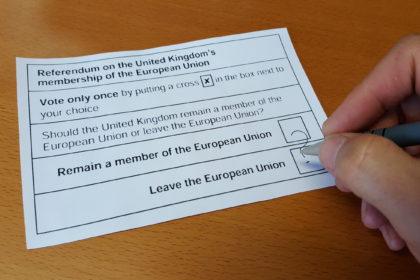
Could your vote have been determined by whether you saw yourself as more similar to Boris Johnson or David Cameron?
There is a common saying that ‘opposites attract’. However, most of the psychological research indicates that we tend to be more attracted to those who are similar to ourselves in any of a number of different ways. These can range from social class to level of physical attractiveness. This was the starting point for Gian Vittorio Caprara and colleagues (Political Psychology, 2007) when they investigated the relationship between voter personalities and the personality styles of prominent politicians.
Previous research by these authors had found that centre-right voters scored higher on Extraversion (in terms of dominance, competitiveness and activity) and Conscientiousness (precision, persistence). On the other hand centre-left voters scored higher on Agreeableness (sensitivity to others) and Openness (open-mindedness, tolerance of diversity). This study took the evidence one step further by showing that people saw their own personalities as being more similar to the personality of the politicians’ they preferred than the ones they didn’t. The implication is that we vote for people whom we perceive as having similar personality styles to ourselves.
So what does this mean in terms of the recent UK referendum on remaining in the European Union? One factor that may have been operating was voters’ appraisal of the main protagonists’ personality styles, and how similar they felt to them in personality terms. Some of those voters in the Remain camp may have seen themselves as more similar to David Cameron in personality style, while some of those in the Leave camp may have seen themselves reflected more in the personality style of Boris Johnson.
But what are the personality style of Cameron and Johnson? While we can’t measure this scientifically without assessment we can speculate on what their personality styles are given what we, the public, know of them. To do this we can use the Big Five personality dimensions that represent a consistent model by which people typically describe themselves and others. The Big Five and its expression in the Quintax Personality Questionnaire is summarised below:
| Big Five Factor | Quintax Factor | Quintax Poles |
| Extraversion | Extraversion | Introvert vs Extravert |
| Agreeableness | Criticality | Personable vs Logical |
| Conscientiousness | Organisation | Adaptable vs Structured |
| Openness | Intellectual Focus | Grounded vs Theoretical |
| Neuroticism | Emotional Involvement | Calm vs Volatile |
Reviewing various biographical and autobiographical material about David Cameron and Boris Johnson we have come up with the following suggested preferences and types for each.
Speculative Quintax Profile for Boris Johnson
| Characteristic | Evidence |
| Clear Extravert | Loves the limelight; holding the stage; being in the public eye |
| Clear Logical | Cutting intellect; loves to persuade by argument; likes to be in control; not a people person or one who engages in small talk |
| Clear Adaptable | Quixotic – happy to change his mind; famously late; likes to start new things – but relies on others to see them through |
| Clear Theoretical | Strong on big ideas without necessarily thinking through their practicality; iconoclastic – impatient with the status quo; likes metaphor and complex argument |
| moderate Volatile | Appears thick-skinned; but may only tolerate ridicule that he has himself manufactured; known for outbursts of temper |
Possible Quintax Type for Boris: ELAT-v
Pen Portrait of a typical ELAT-V: A tireless innovator with a strong investment in action, change, improvement and learning. Enjoys discussion, debate and persuading others to a point of view. Focuses on the ‘grand plan’ rather than details, relying on ingenuity to deal with unforeseen difficulties. Prefers freedom of action to precise schedules. Willing to take risks and learn from both failures and successes. Places high value on personal competence. Under pressure can become self questioning, or obstinate and anxious about small details.
Speculative Quintax Profile for David Cameron
| Characteristic | Evidence |
| Moderate Extravert | Confident leader; looks to take action, make an impact |
| Slight Personable | Happy with small talk; likes company; more a dog person than a cat person by his own admission |
| Clear Structured | Strong sense of responsibility; works long hours; attends to details; adheres to values |
| Clear Grounded | Describes himself as practical & pragmatic; distrusts those with a grand vision; relies on others for big ideas; seeks reform not revolution |
| Clear Calm | Rarely appears to flap or lose self-control; more optimistic than pessimistic |
Possible Quintax Type for David: epSG-C
Pen Portrait of a typical EPSG-C: Perceptive and competent in social settings. Likes to bring order and harmony into the affairs of others. Inclusive, helpful, cooperative and tactful. Listens to others and seeks mutually satisfactory compromises. Committed and dependable, willing to put in high degrees of effort – expecting the same from others. Always ready to praise, but can also show disappointment when others lack effort. Seen by others as trustworthy and motivating. Typically resilient to stress, but can be hurt by unkind reactions.
On this speculative analysis, the two men appear to be almost polar opposites.
This is reinforced when we look at some further implications of their estimated style differences. In terms of Innovation and Approach to Change Boris emerges as an Innovative Changer, his combination of Adaptable with Theoretical meaning that he much prefers radical innovation to incremental improvement. Innovative Changers like to tear down the old, take a clean sheet of a paper and start with ‘Big Picture’ statements about a new future. David, on the other hand, comes out as more of a Creative Improver. His preferences for Structure and a Grounded approach mean that, on our estimate, he will seek to gradually improve what is already in place rather that start from scratch. His practicality and sense of responsibility means that he will always look to consider the implications of a change before he makes it.
So, as a voter did you identify more with in personality terms, Boris or with David? What personality traits do you have in common? And where do you differ? Caprara and colleagues’ research suggests that you will have a closer personality match to the leader of the campaign that you eventually voted for. But what do you think? Did these similarities and differences have any impact on your voting behaviour, or were your views driven solely by the issues in the Brexit debate alone?
Reference:
Gian Vittorio Caprara, Michele Vecchione, Claudio Barbaranelli and R. Chris Fraley. When Likeness Goes with Liking: The Case of Political Preference. Political Psychology Volume 28, Issue 5, pages 609–632, October 2007. Found at: http://www.web-research-design.net/PDF/CVB&F2007.pdf




You must be logged in to post a comment.